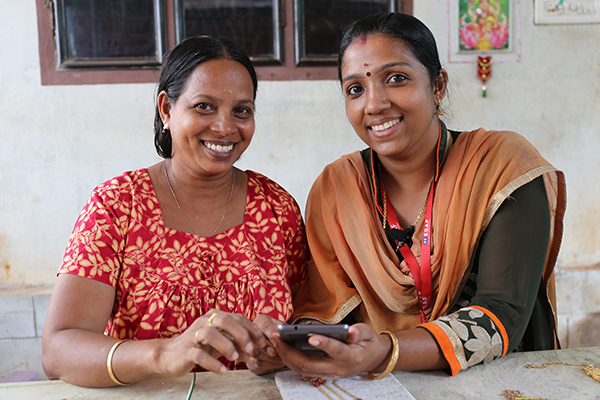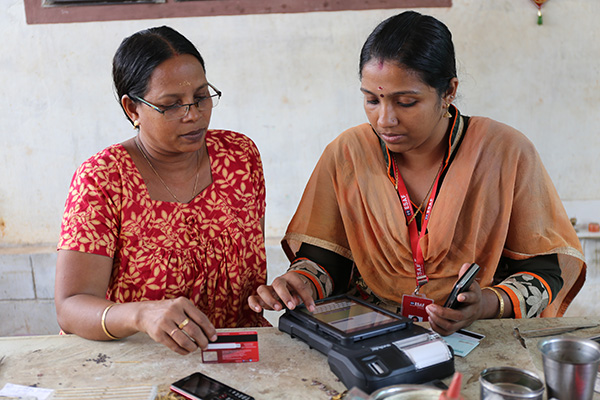The power of digital finance in a pandemic

Technology is helping women access their finances without the need to travel to a bank branch. © Opportunity International US
Accessing and managing money is one of the biggest challenges for people living in poverty – yet it is essential for them to unlock basic services. As we move towards an increasingly digitalised world, how do we ensure they aren’t left behind? Opportunity International’s Digital Financial Services team explains.
Digital financial inclusion is driving the next wave of growth in the microfinance industry. Increasing access to smart phones is seeing a gradual shift from cash to digital finance – for school fees, ecommerce, savings, credit and more.
Mobile phones and the Internet increasingly offer an alternative to debit and credit cards for making direct payments from an account. For the first time in 2019, digital transactions accounted for the majority of mobile money flows. The number of registered mobile money accounts reached more than 1 billion in 95 countries and accounted for US$1.9 billion transacted every day.
‘Digital financial inclusion’—digital access to and use of financial services by excluded and underserved populations—will be essential for those living in poverty. Amidst a pandemic and social distancing measures, the need is even greater.
Barriers to digital finance
People living in poverty are typically risk averse, prefer cash and lack trust in digital finance. In India, the economy has traditionally been dominated by cash. The country has the second largest unbanked population in the world—190 million—and of those with an account, almost half are inactive. Low population density and poor infrastructure in rural areas makes it costly to reach clients through a traditional brick-and-mortar model.
Another barrier is a lack of financial literacy. Those in rural areas, in particular women, are more likely to be illiterate and with lower numeracy skills. Mark Daniels, Asia Programs Director for Opportunity International Australia, said word of mouth plays an important role too.
“If others in the community have found their digital interactions to be complicated or unreliable, this will have a profound effect on others’ willingness to engage with digital services,” Daniels said.
“We may think of those who have less as having simpler financial lives, but studies have shown that in fact the opposite is true. Poorer households often use a large number of different financial instruments and engage in various often complicated strategies to smooth their consumption.”
“Technology-enabled solutions are therefore key in reaching and serving these populations sustainably and bringing the most marginalized groups–primarily women—into financial inclusion.”
Increasing access to basic finanical services
Digital finance can lead to greater financial inclusion and increase access to basic services for people in poverty by:
- reducing the risk of loss and theft posed by cash-based transactions
- allowing customers to transact in irregular, tiny amounts, helping them to manage their characteristically uneven income
- increasing access to formal financial services such as payments, transfers, savings, credit and insurance
- contributing to economic growth and stability.
Digital financial inclusion for all
Opportunity International Australia’s partners continue to move towards using digital technology to make financial services more accessible and to give clients more freedom with transactions.
Paperless methods of data collection and cashless transactions, whilst still in their infancy, enable our partners to operate more efficiently and safely. It increases security as loan officers are less likely to be targeted for robberies, and safeguards health as cash can be a means by which communicable disease is spread from person to person.
“When we introduce a new digital service… we incorporate elements of digital financial literacy to help the clients become comfortable and confident.”
Globally, Opportunity International is testing and developing innovations such as Interactive Voice Response (IVP), to encourage low-income, illiterate women to use mobile phones for their finances. A recent pilot in Ghana and Uganda used IVP technology to send clients automated audio messages reminding them to save, or about upcoming loan repayments.
“Low-income women often understand and use mobile phones as a tool to call relatives but using mobile phones for their banking needs can be uncomfortable and uncertain,” said Rosa Wang, Global Director, Digital Financial Services, Opportunity International. “When we introduce a new digital service and we are trying to deepen usage, we incorporate elements of digital financial literacy to help the clients become comfortable and confident.”
Overall, the pilot saw greater engagement rates with women clients, and encouraged positive savings behaviour.
“As IVP is further developed, women will gain access to digital tools that allow them to send and receive messages in their local dialect, which will help increase women’s confidence and capabilities in using mobile phones.”

“Now that we have the tablet, we are able to add more members quickly and meet their needs fast." Renju, an ESAF loan officer, processes a small loan client’s repayment with the help of a tablet. © Opportunity International US
Looking ahead
Amid lockdowns and social distancing measures, the coronavirus pandemic will accelerate the digitalisation of the microfinance sector. Many institutions have taken steps to reduce exposure to the virus through personal protective equipment and social distancing in group meetings. However, Daniella Hawkins, Programme Coordinator for Opportunity International, said those with digital channels will be more resilient.
“Mobile banking offers a fast and contactless means of making payments and transferring funds from the safety of the customer’s home,” Hawkins said. “Looking at a number of Opportunity International’s partners in Africa reveals that between February and May of 2020 the number of transactions carried out via mobile banking increased by 16 per cent.”
“The pandemic therefore provides an opportunity for financial institutions to assess their digitialisation journey, identify areas for development and implement changes that are gender-sensitive and client-centric.”
Learn more about Opportunity International Australia's
impact in India